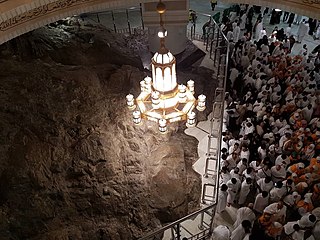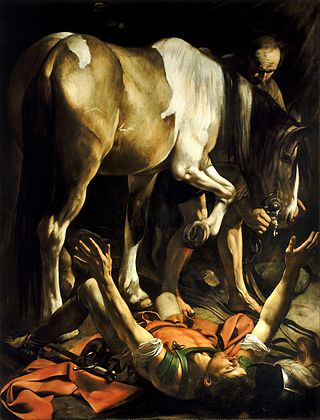Faith, derived from Latin fides and Old French feid, is confidence or trust in a person, thing, or concept. In the context of religion, one can define faith as "belief in God or in the doctrines or teachings of religion". According to Merriam-Webster's Dictionary, faith has multiple definitions, including "something that is believed especially with strong conviction," "complete trust," "belief and trust in and loyalty to God," as well as "a firm belief in something for which there is no proof".

Religion is a range of social-cultural systems, including designated behaviors and practices, morals, beliefs, worldviews, texts, sanctified places, prophecies, ethics, or organizations, that generally relate humanity to supernatural, transcendental, and spiritual elements—although there is no scholarly consensus over what precisely constitutes a religion. Different religions may or may not contain various elements ranging from the divine, sacredness, faith, and a supernatural being or beings.
Religious conversion is the adoption of a set of beliefs identified with one particular religious denomination to the exclusion of others. Thus "religious conversion" would describe the abandoning of adherence to one denomination and affiliating with another. This might be from one to another denomination within the same religion, for example, from Protestant Christianity to Roman Catholicism or from Sunnī Islam to Shīʿa Islam. In some cases, religious conversion "marks a transformation of religious identity and is symbolized by special rituals".

Sociology of religion is the study of the beliefs, practices and organizational forms of religion using the tools and methods of the discipline of sociology. This objective investigation may include the use both of quantitative methods and of qualitative approaches.
Apostasy is the formal disaffiliation from, abandonment of, or renunciation of a religion by a person. It can also be defined within the broader context of embracing an opinion that is contrary to one's previous religious beliefs. One who undertakes apostasy is known as an apostate. Undertaking apostasy is called apostatizing. The term apostasy is used by sociologists to mean the renunciation and criticism of, or opposition to, a person's former religion, in a technical sense, with no pejorative connotation.

Pierre Bourdieu was a French sociologist and public intellectual. Bourdieu's contributions to the sociology of education, the theory of sociology, and sociology of aesthetics have achieved wide influence in several related academic fields. During his academic career he was primarily associated with the School for Advanced Studies in the Social Sciences in Paris and the Collège de France.
In sociology, secularization is the transformation of people or a society from identification with traditional, formal belief systems or religious values and institutions toward unacknowledged belief systems or seemingly non-religious values and secular based belief systems. The secularization thesis expresses the idea that through the lens of the European enlightenment modernization, rationalization, combined with the ascent of science and technology, religious authority diminishes in all aspects of social life and governance. In recent years, the secularization thesis has been challenged due to some global studies indicating that the irreligious population of the world may be in decline as a percentage of the world population due to irreligious countries having subreplacement fertility rates and religious countries having higher birth rates in general. Christian sociologist Peter L. Berger coined the term desecularization to describe this phenomenon. In addition, secularization rates are stalling or reversing in some countries/regions such as the countries in the former Soviet Union or large cities in the Western world with significant amounts of religious immigrants. Even global studies show that many people who do not identify with a religion, still hold religious beliefs and participate in religious practices, thus complicating the situation.

The Protestant Ethic and the Spirit of Capitalism is a book written by Max Weber, a German sociologist, economist, and politician. Begun as a series of essays, the original German text was composed in 1904 and 1905, and was translated into English for the first time by American sociologist Talcott Parsons in 1930. It is considered a founding text in economic sociology and a milestone contribution to sociological thought in general.
In Modern English, cult is a term for relatively small group that excessively controls its members, whom share set of acts and practices which require unwavering devotion, and are considered deviant, and typically led by a charismatic and often self-appointed leader. Considered pejorative by some, this term is less often used for a social group that is defined by its unusual religious, spiritual, or philosophical beliefs and rituals, or its common interest in a particular personality, object, or goal. This sense of the term is weakly defined – having divergent definitions both in popular culture and academia – and has also been an ongoing source of contention among scholars across several fields of study.
In the field of sociology, cultural capital comprises the social assets of a person that promote social mobility in a stratified society. Cultural capital functions as a social relation within an economy of practices, and includes the accumulated cultural knowledge that confers social status and power; thus cultural capital comprises the material and symbolic goods, without distinction, that society considers rare and worth seeking. There are three types of cultural capital: (i) embodied capital, (ii) objectified capital, and (iii) institutionalised capital.

The sociology of culture, and the related cultural sociology, concerns the systematic analysis of culture, usually understood as the ensemble of symbolic codes used by a member of a society, as it is manifested in the society. For Georg Simmel, culture referred to "the cultivation of individuals through the agency of external forms which have been objectified in the course of history". Culture in the sociological field is analyzed as the ways of thinking and describing, acting, and the material objects that together shape a group of people's way of life.

Conversion to Christianity is the religious conversion of a previously non-Christian person to Christianity. Different Christian denominations may perform various different kinds of rituals or ceremonies of initiation into their community of believers. The most commonly accepted ritual of conversion in Christianity is through baptism, but this is not universally accepted among them all. A period of instruction and study almost always ensues before a person is formally converted into Christianity and becomes a church member, but the length of this period varies, sometimes as short as a few weeks and possibly less, and other times, up to as long as a year or possibly more.
Sociology of Religion is a 1920 book by Max Weber, a German economist and sociologist. The original edition was in German.

The sociology of education is the study of how public institutions and individual experiences affect education and its outcomes. It is mostly concerned with the public schooling systems of modern industrial societies, including the expansion of higher, further, adult, and continuing education.
Sexual capital or erotic capital is the social power an individual or group accrues as a result of their sexual attractiveness and social charm. It enables social mobility independent of class origin because sexual capital is convertible, and may be useful in acquiring other forms of capital, including social capital and economic capital.
Growth of religion involves the spread of individual religions and the increase in the numbers of religious adherents around the world. In sociology, desecularization is the proliferation or growth of religion, most commonly after a period of previous secularization. Statistics commonly measure the absolute number of adherents, the percentage of the absolute growth per-year, and the growth of converts in the world.
Rodney William Stark was an American sociologist of religion who was a longtime professor of sociology and of comparative religion at the University of Washington. At the time of his death he was the Distinguished Professor of the Social Sciences at Baylor University, co-director of the university's Institute for Studies of Religion, and founding editor of the Interdisciplinary Journal of Research on Religion.
Religious economy refers to religious persons and organizations interacting within a market framework of competing groups and ideologies. An economy makes it possible for religious suppliers to meet the demands of different religious consumers. By offering an array of religions and religious products, a competitive religious economy stimulates such activity in a market-type setting.
The archaeology of religion and ritual is a growing field of study within archaeology that applies ideas from religious studies, theory and methods, anthropological theory, and archaeological and historical methods and theories to the study of religion and ritual in past human societies from a material perspective.

The definition of religion is a controversial and complicated subject in religious studies with scholars failing to agree on any one definition. Oxford Dictionaries defines religion as the belief in and/or worship of a superhuman controlling power, especially a personal God or gods. Others, such as Wilfred Cantwell Smith, have tried to correct a perceived Western bias in the definition and study of religion. Thinkers such as Daniel Dubuisson have doubted that the term religion has any meaning outside of western cultures, while others, such as Ernst Feil even doubt that it has any specific, universal meaning even there.







